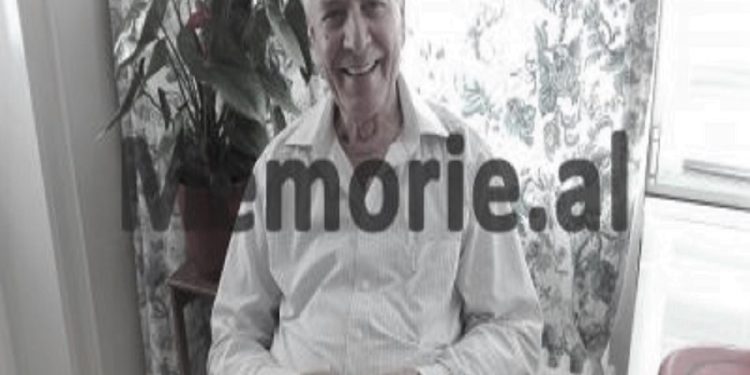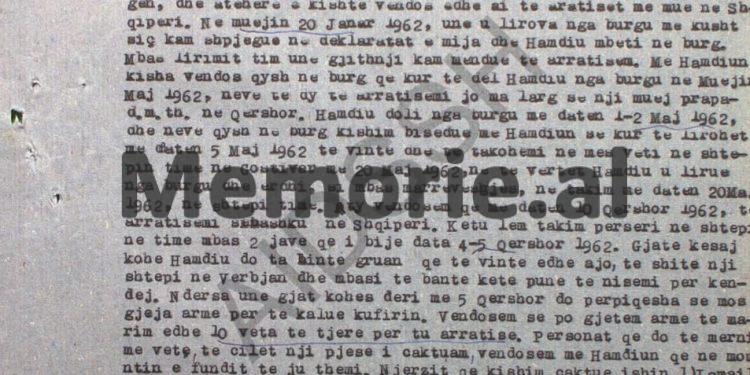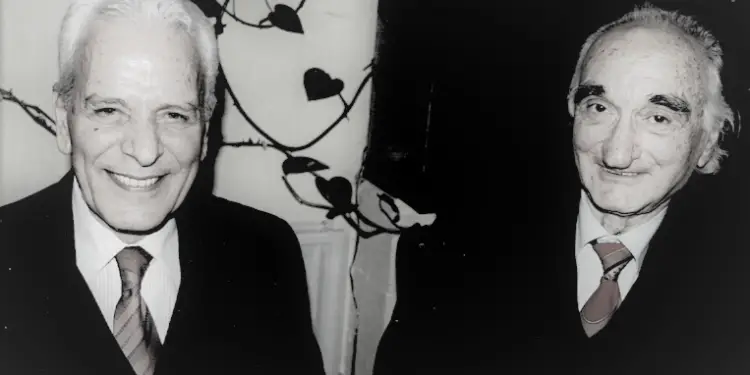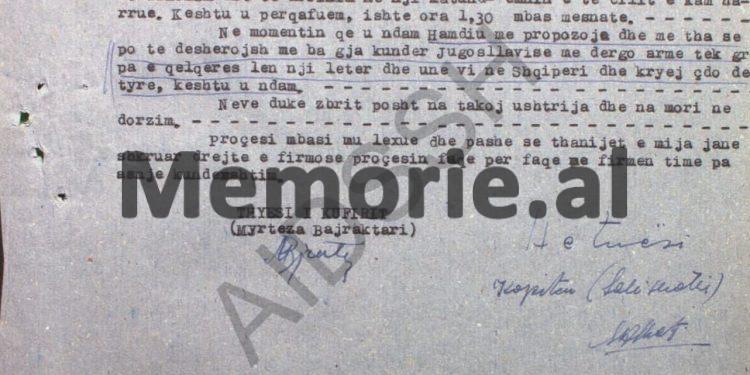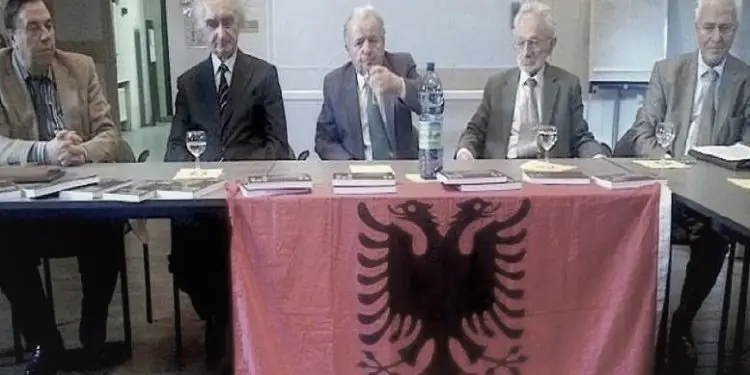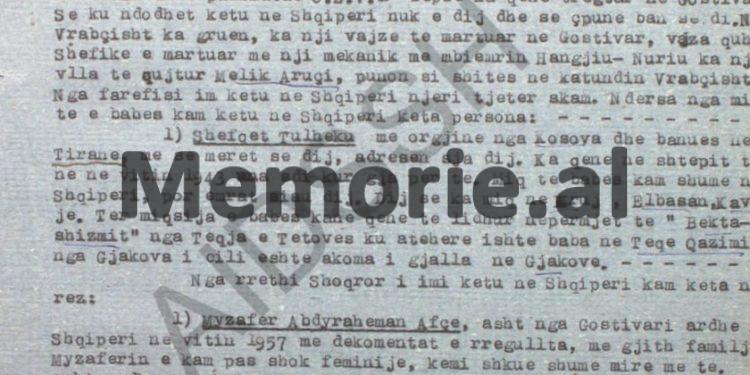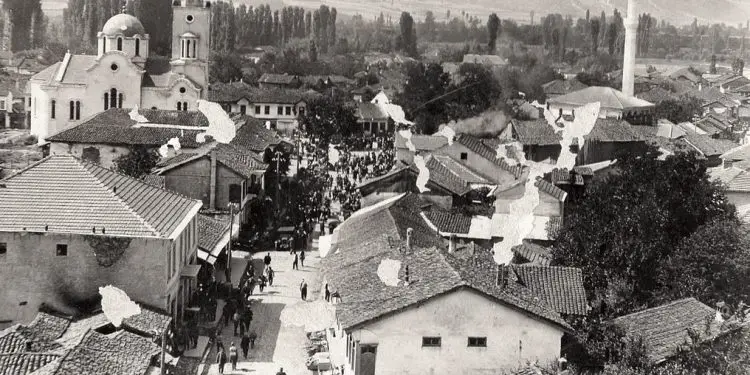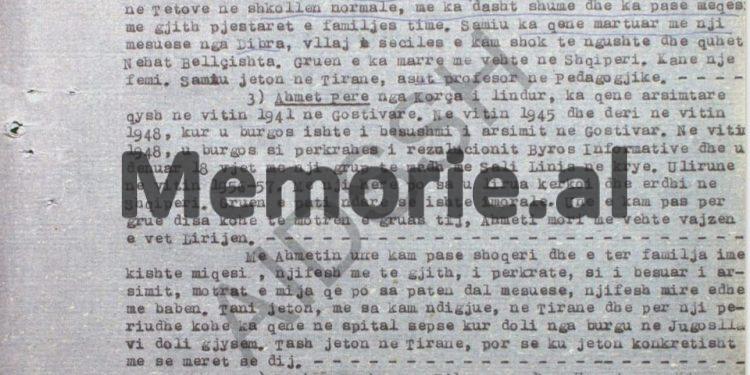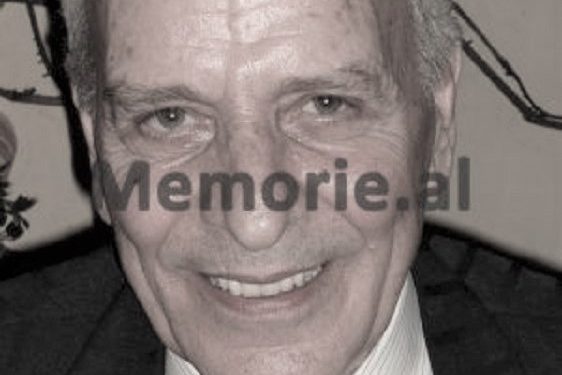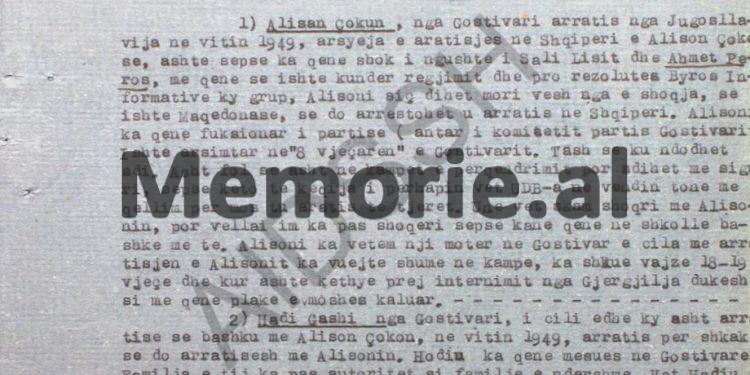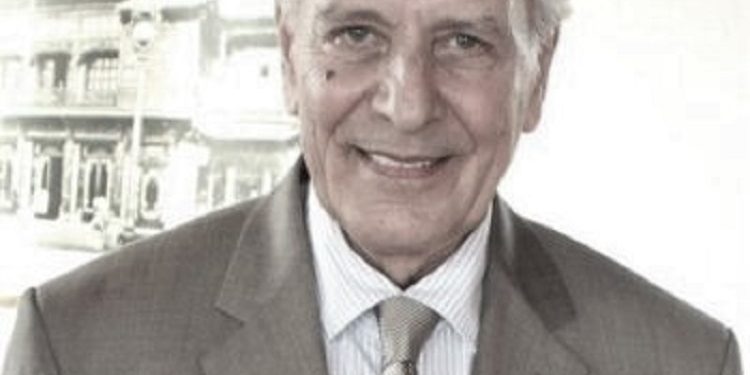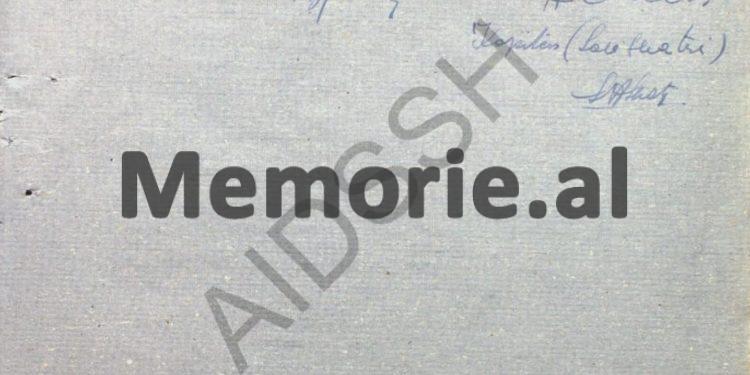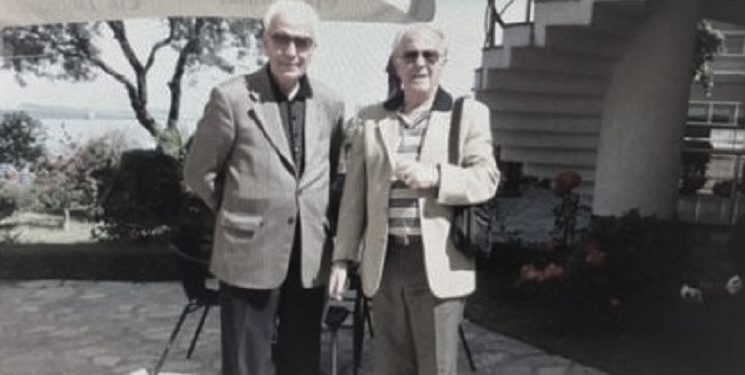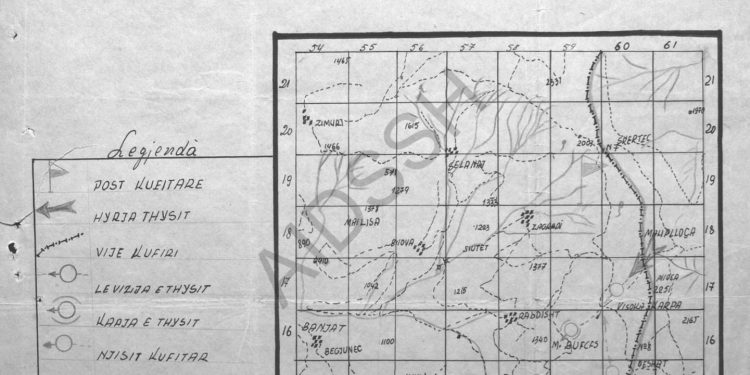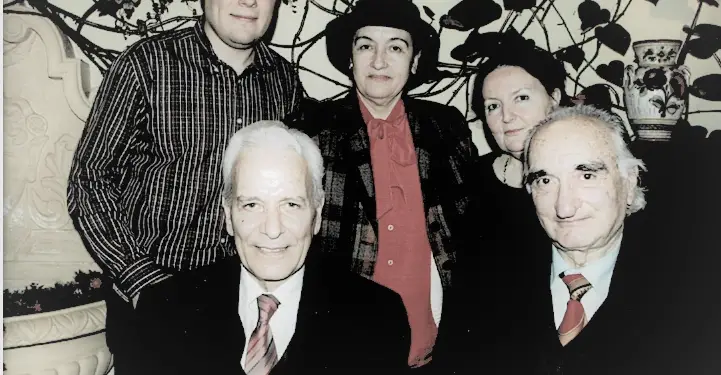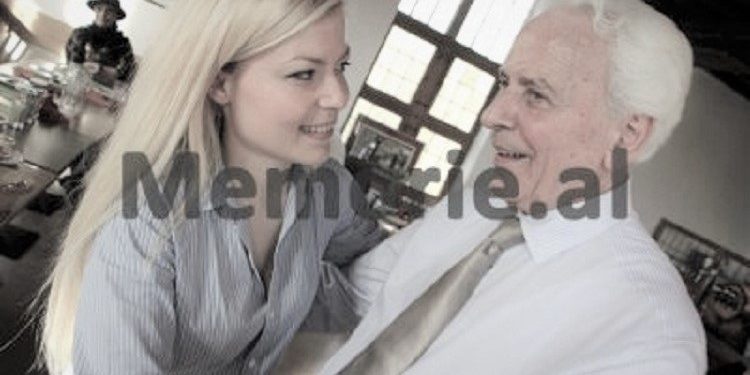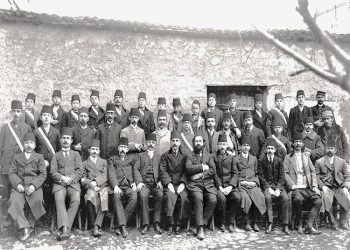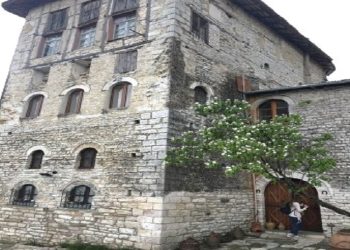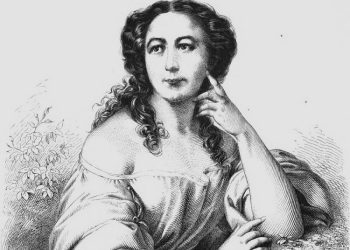Dashnor Kaloçi
Second part
Memorie.al/ publishes some archival documents issued by the institution of the Authority for Information of Former State Security Files, where is the voluminous file (forms, investigative and court), of Myrteza Bajraktari originating from Gostivar, who after finishing school high school in the city of Tetovo, in 1952, began his higher studies at the University of Skopje, in the branch of Philosophy, where in addition to teaching he was employed as a journalist in the newspaper “Flaka e Vllaznimit” published in Skopje, from where he was fired soon after, he published an article where he was openly against the displacement of Yugoslav Albanians to Turkey and as a result, he was appointed as a teacher in the 7-year school “Shaban Zeneli” in Kumanovo. Myrtezai was arrested by the UDB in 1952, after he was part of a secret organization called the ‘Albanian National-Democratic Organization’, and he was sentenced to seven years in political prison, which he served in the Nis prison and Idrizovo. Escape from Yugoslavia and coming to Albania, where after staying for some time in the internment camp in Seman of Fier, he was given the right to high school, graduating from the University of Tirana in Language and Literature, but after refusing the appointment in the city of Berat, in 1971, he was arrested and sentenced to seven years in political prison, on charges of “agitation and propaganda”. Release from prison and leaving without work until the collapse of the communist regime and his appointment as Consul General of Albania in Switzerland, until 1993, and then his election as Honorary President of the Albanian League in the World, for the countries of Benelux, where he worked for the cause of Kosovo, until he passed away on December 11, 2020. The entire complete file of Myrteza Bajraktari, with the names of officials and officers of the State Security, the nicknames of collaborators, “colleagues” and The “compatriots” who followed and monitored him, the provocateurs in the investigation cells, the witnesses who appeared in court, the letters sent to Enver Hoxha and the high official instances where he demanded his innocence, etc., etc., are published for the first time by Memorie .al
Continued from the previous issue
The document with the minutes of the interrogation of Myrteza Bajkaktari, by the investigator of the Ministry of Internal Affairs, Captain Sali Shatri, in the ‘Infiltration Center of Yugoslav citizens’ in Shijak, on July 20, 1962
PROCESS – VERBAL
Shijak on 23/8/1962
I, the Investigator of the Ministry of Internal Affairs, Captain Sali Shatri, interrogated the border breaker, the Yugoslav citizen Myrteza Bajraktari, who deposited:
Question: Tell us the itinerary you have followed since the place of departure for escape?
Answer: Since I was in Idrizovo prison, I decided to escape to Albania, it was 1960, later on this decision, I talked in the spring of 1961, with Hamdi Ajdini, from the village of Verbjana in Mavrovo. We decided that as soon as we were released from prison, both of us, Hamdiu would escort me to Albania, because he knew the way and then he had also decided to escape with me to Albania.
On January 20, 1962, I was released on parole, as I explained in my previous statement, and Hamdi remained in prison. After my release, I always thought of escaping. Hamdiu was released from prison on 1-2 May 1962 and we had talked to Hamdiu since he was in prison, that when he was released on 5 May 1962, he would come and meet at my house in Gostivar.
From June 10, 1962 until June 16, 1962, I stayed in Skopje and talked to Adnan Again, to whom I told that I would flee to Albania, without telling him the date. I told Adnan to say goodbye to Sheraf Aga and say that he was sorry I had not met him for the last time.
On June 15, 1962, according to a conversation we had had earlier about our escape plan, I met Bektesh Ismaili in Skopje, where we talked and told him that we would leave for escape the next day, June 16, 1962.
It was 7.00 in the morning when I met Bekteshi and we went for a walk in the park, talking about how we were going to escape, later we went to the village of Nerez, near Skopje 3 km.
The reason we went, was that Bektashi had a cousin of his named Xhemal, he had an unlicensed shooter and we thought of stealing it, but he was not at home and our plan failed. We returned to Skopje by bus. We went shopping to buy a suitcase, for the clothes we would take with us.
On June 16, 1962, at 7.00, Bekteshi came and together with him, we decided to leave Skopje by bus. I will leave by bus at 9 or 9.30, which goes from Skopje to Gostivar. While Bektashi, will depart by bus at 14.00, which will take you from Skopje to Debar. So it was decided, for reasons not to see us both together.
We each received the tickets separately at the respective schedules. At 9-9.30 we shared with Bekteshi at the bus station, I got the ticket 390 dinars, to Gostivar and left for Gostivar. On the way home, near a confectionery, Hamdi Ajdini was waiting for me, with whom we had talked before and had left the meeting at my house, on June 16, 1962.
Hamdiu told me that he could not convince his family to flee to Albania, but told me that he would accompany you to the border. At 16.00 we got on the bus, inside was Bekteshi, who had left Skopje, the three of us joined without talking to each other, Bekteshi and I said goodbye. We traveled from Gostivar to Mavrovo, where the bus stopped for a while, Zirovinca also stopped.
We all went down to Vitushe, me and Bekteshi and Hamdiu, crossed the bridge and entered an alley in the forest. Here in the woods we sat for 30 minutes, then walked down the driveway and then back into the woods, opened the suitcases and shared the luggage and left the suitcase in the woods, waited until dusk fell. We walked to the mill and from there; we looked at the buildings where the army officers live and the apartments of the border soldiers.
Then we walked the forest roads at intervals, resting for a while, after crossing the forest, we went to all the valleys and hills, from where Korab looks good. There we saw a water line, drank water and rested a bit. We walked in the direction of Korab for about 2 hours and then we reached a place, from where you can see the broken Yugoslav border post, built in the time of the King.
Again we walked towards the gorge of Korab. After a long walk, Hamdi was the first prince and he saw the lights of Peshkopi and signaled us to cross, when we joined Hamdi, he told us that we are now in the territory of Albania.
After we went to the border, Hamdiu told us that this is Albanian territory and escorted us another 100 m. in depth, he told us where we were going and to reach a village, the name of which I have forgotten. So we hugged, it was 1.30 after midnight.
We were coming down; the army met us and took us over.
BORDER BREAKER Investigator
Myrteza Bajraktari Captain Sali Shatri
The document with the minutes of the interrogation of Myrteza Bajkaktari, by the investigator of the Ministry of Internal Affairs, Captain Sali Shatri, in the ‘Infiltration Center of Yugoslav citizens’ in Shijak, on August 24, 1962
PROCESS-VERBAL
Shijak on 24.8.1962
I, the investigator of the Ministry of Internal Affairs, Captain Sali Shatri, interrogated the border breaker, the Yugoslav citizen Myrteza Bajraktari, who testified:
Question: Tell us which of the well-known relatives from your social circle, do you have or know here in Albania, whether they came from long ago or came later as emigrants from Yugoslavia?!
Answer: I, from my relative in Albania, have a second cousin of my mother named Nuri Aruçi, from the village of Vrapçisht in Gostivar. Nuriu came to Albania in 1944, because they wanted to shoot him, because he was a merchant in Gostivar. Where he is here and what work he does, I do not know.
In Vrapciste he has a wife and a daughter married in Gostivar. Her name is Shefike and she is married to a mechanic with the surname Hanxhiu. Nuriu has a brother named Melik Aruçi, who works as a salesman in Vrapçisht.
From my relative another man in Albania, I do not have. While from my father’s friends, in Albania I have these people:
- Shefqet Tulheku, originally from Kosovo and resident in Tirana. What he does and where he lives, I do not know exactly. He was at our house in 1943. I know nothing about him. I have many fathers’ friends in Albania but I do not know their names. I know that there are friends in Kruja, Elbasan and Kavaja. The whole friendship of the father was connected by “Bektashism” from the Tetovo Teqe. From my social circle in Albania, I have these people:
- Myzafer Afce from Gostivar, came to Albania in 1957, with regular documents. I had him as a childhood friend. Myzaferi came to Albania with his whole family because he did not like the Yugoslav regime. I, at the time Myzaferi came to Albania, was in prison. The guest in Yugoslavia was an ardent patriot and nationalist.
He also has a brother in Skopje named Telat, who works in the editorial office “Flame of Brotherhood”. Telati is a fox man and UDB agent. Myzaferi, is married, but I do not know if he has children. Myzaferi has a married sister, with an Albanian army officer with the rank of colonel. The name of his sister’s husband, I do not know.
The guest is here, the other brother Mit’hat is unmarried and he has a very good attitude. Myzaferi has in Albania, a married sister named Nezafet, a mother named Sofie, who is about 60 years old, as well as his wife, whose name I do not know. They live in Tirana and my connection with them is that I was a close friend of Myzafer.
- Sami Lameja, from Albania. Born here but displaced, I do not know where. Samiu was a teacher in Tetovo and Gostivar in the ’40s. As it was said there, UDB wanted to send him to Albania as an Albanian citizen. He refused, and was later deported from Yugoslavia. I had Sami as a professor in Tetovo at the ‘Normale’ school.
He was married to a teacher from Dibra, whose brother I have a friend and his name is Nehat Belçishta. He has taken his wife here and they have a child. Samiu, lives in Tirana and is a professor of Pedagogy.
- Ahmet Pere, from Korça. He was a teacher in Gostivar in the ’40s. Until 1948 when he was imprisoned, he was the symbol of education in Gostivar. He was sentenced to 18 years in prison as a supporter of the Informbureau. He was released in 1956-’57 and immediately came to Albania. He divorced his first wife.
I have had for some time as a wife, his sister-in-law. Samiu took his daughter with him and she is called Lirie. With Ahmeti, me and my whole family, there was friendship. Now he is in Tirana, but I do not know the exact address.
- Rexhep Rexha from Dibra e Madhe. I met him in 1950 and then in 1957, we had a friendship in Idrizovo prison. He was convicted twice for holding a nationalist stance against the Yugoslavs.
He came to Albania from Yugoslavia in 1957, when he was released from prison. Another person from my social circle in Albania, I do not have. I know in Albania these people, who came with regular documents from Yugoslavia.
- Mahmut Dumani, is from Elbasan. Mahmuti, had Albanian citizenship and was repatriated, with the whole family in the years 1955-‘56. He served as a teacher in the 1940s in Kichevo and Skopje. Dumani, in the years 1945-’46, was arrested and convicted as a member of an Albanian nationalist group.
I knew him when he was released in 1951, but I have no friendship with him and I know where he lives. He had a good attitude, because he was an opponent of the Yugoslav regime. I have heard that these people have come to Albania, legally, but I neither know nor know them:
- Pjetër Kavaja, 2. Josif Todi, for Josif, I am not sure if he is in Albania, or if he has gone to another country. As for the fugitives from Yugoslavia to Albania, I know these people:
- Alisan Çokun, from Gostivar. Fugitive from Yugoslavia in 1949. The reason for his escape to Albania is that he was a friend of Sali Lis and Ahmet Peres. Alisani was a party official for the city of Gostivar. Where he lives now, I do not know but it is rumored that he is in concentration camps.
I believe that this false news is given by UDB itself, in order for other Albanians not to escape. My brother has been friends with her. Alisani also has a sister who suffered a lot from his escape, so much so that when she returned from exile, from a young girl, she looked like an old woman of old age.
- Hadi Gashin from Gostivar. And he escaped with Alisan Çoku in 1949. His family had influence in Gostivar. I did not have friends with him, but I found out that his wife has remarried. I do not know where Hadi I am now. I do not know other people who escaped from Yugoslavia. I heard that these people also fled to Albania:
- Kapllan Kaloshi from Montenegro. Personally I do not know. I only saw him once, when he was a soldier in Skopje. As far as I know this has been a writer. My friends told me that he had been convicted in Idrizovo prison as an opponent of the Titoist regime. Friends like Raif Malaziu, Sheraf Agai, Adnan Agai, etc. say he has maintained a good attitude in prison.
I heard that he has an officer brother, in the Yugoslav infantry. Kapllani fled in 1959 because he could not stand Yugoslav politics. He is well acquainted with my son-in-law, Mehmetali Hoxha, but I do not know anything else about him.
I do not know other people with names who fled to Albania. I know they have come a lot but I do not know the names. After reading the minutes, and seeing that my statements were spelled correctly, I signed it page by page without any objection. Memorie.al
Boundary Breaker Investigator
(Myrteza Bajraktari) Captain (Sali Shatri)
The next issue follows




